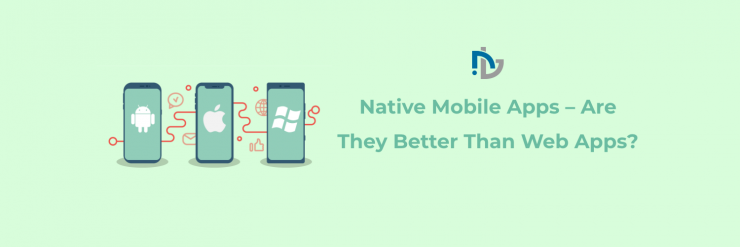There is a general discernment that native mobile applications – which can be straightforwardly downloaded from the Play Store and introduced on your phone – are easier to understand than web-based apps, regarding their general features. The great deals figures of native apps additionally apparently bear proof to this view. In any case, make these native, tweaked applications truly outmaneuver the web apps all in all?
We should investigate:
Creation – As far as the procedure of mobile application development is concerned, native apps do win without a doubt. Since they are altered for the distinctive portable stages, the whole coding is finished by the in-house designers of app organizations. Distinguishing bugs (assuming any) and discharging refreshes is less demanding, and observing the application examination turns into a snap as well. The time factor is a worry, however, and we will go to that later
Speed – This round additionally goes to native mobile applications. When you buy and introduce an app from a Blackberry or iPhone application development company, it naturally turns into a piece of your handsets worked in features. Propelling them on perfect handsets barely takes more than a couple of moments. Web apps, because of their prerequisite of genuinely stable web availability consistently, are commonly slower.
Read more: 10 Simple Tools for Building Mobile Apps Fast
Cost Factor – From expert app designers, the mobile application development cost for native apps is altogether higher than that of the web-based ones. Applications that are perfect over a few stages, specifically, can be reasonably expensive. The average time required to make models of native apps is likewise higher. On the off chance that you lean toward native applications, you’ll need to hold up additional!
Ease of Use – According to specialists from any best iPhone or Android Application Development Company, both native apps and web apps can be easy to understand – although the previous appears to have the edge here. This is because most native applications can be consistently coordinated with the phone camera, sound/video recorder, and other handset features. Apps downloaded from mobile websites are not liable to have this feature.
App Store Approval – A noteworthy point where web apps outscore the native mobile applications. For an engineer who is in the matter of iPhone app development, it can take up to half a month, to get new applications approved and showed at the online app stores. And, after it’s all said and done, there is no certification that the app would almost certainly gather adequate measures of clients’ advantage. Web applications don’t require such store approval, and are, thus, simpler to advance.
Security – While getting permeability on the app stores can be a somewhat time-expending process, and the technique can work for native apps as well. People can rest guaranteed that a mobile application which has been quality-tried and approved by driving app stores would be without bug and entirely secure (both as far as its task, just as its impacts on the phone on which it is utilized). No such affirmation is accessible for mobile web apps, although the more outstanding ones can be effectively trusted.
Prerequisite of inward memory – Native applications require a specific, pre-determined measure of memory space in handsets – for working proficiently. That is correctly why so much significance is given on choosing a mobile application development system that would not expend excessively of the available data transmission on smartphones. Since web apps needn’t bother with any additional memory space to be propelled and worked, their comfort is unquestionably higher on this tally.
It is checking app execution – Way all the more trying for native apps than it is for web-based applications. A mobile application development company work in native app-creation would typically need to build up different versions of each app – relying upon the stage (phone, Blackberry, or Android) on which it would be utilized. The examination for every one of these versions must be followed, to get a thought of how the application is performing. To the extent web apps are concerned, they have a single release, making execution following a lot less demanding.
Finding the Essential Apps – With the array of web apps accessible, it can, at times turn out to be marginally precarious for clients to locate the ones that they require on their phones. There is no such space for disarrays concerning native mobile apps, however – since they are efficiently shown on the Apple Play Store, Android store and the Blackberry App World. Choosing and downloading native apps is commonly considerably less unwieldy than scanning for reasonable web apps.
Maintenance – Since native apps by and large include redid coding for the distinctive development stages, their preservation is esteemed to be in any event somewhat more difficult than that for web apps. The last usually have a cross-stage single coding included, making the undertaking of changes (whenever required) less demanding also. The maintenance cost figures for web applications, naturally, are additionally lower.
At times, it tends to be hard to keep a tab on which version of a native app somebody is utilizing, which makes taking off redesign designs somewhat troublesome. As far as quality and execution, however, these native applications are for the most part superior to web apps. Everything considered native apps do appear to offer more client favorable circumstances – even though web apps additionally have a few positive purposes of their own.
Read More: Simple Guidance For You In Android App Development









